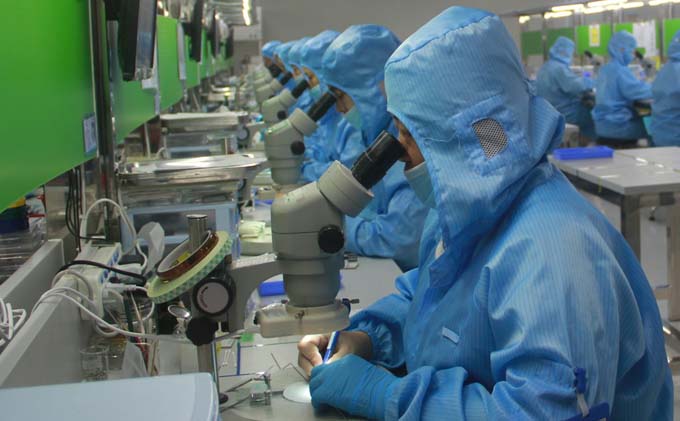Pharmaceutical industry: Rising returns in research and development
Last year, the global pharmaceutical industry once again achieved higher returns in research and development (R&D) than in the previous year. This was the result of the annual analysis of the world's 20 largest pharmaceutical companies by the auditing and consulting firm Deloitte.

The return on innovation in research and development (R&D) of the world's 20 largest pharmaceutical companies rose to 4.1 percent in 2023. Following the record low of 1.2 percent in 2022, this is a pleasing development, according to the latest pharmaceutical study by auditing and consulting firm Deloitte. It also points to a recovery in yields, which have been largely declining for more than ten years. The only major increase in productivity (6.8%) was recorded in 2021 as a result of the rapid approval and emergency authorization of drugs in the wake of the COVID-19 pandemic. "The current positive development is driven by new research areas such as sustainable weight management, Alzheimer's disease and mRNA vaccines to protect against other infectious diseases," explains Alexander Mirow, Head of Life Sciences Consulting at Deloitte Switzerland.
Pharmaceutical industry invests more in R&D again
Absolute financial investment in research and development has also risen. In the 2023 financial year, the 20 leading global pharmaceutical companies with the highest research expenditure - including the two Swiss pharmaceutical groups Novartis and Roche - invested USD 145 billion in their research and development, which corresponds to an increase of 4.5% compared to the previous year. The average R&D costs for the development of a drug - from drug identification to market launch - remained constant at USD 2.3 billion. The forecast peak sales of a drug fell from USD 389 million in 2022 to USD 362 million in 2023.
According to the latest pharmaceutical study by Deloitte, the overall increase in R&D costs is due to several factors, including more complex study requirements, regulatory changes such as the Inflation Reduction Act (IRA) in the US and the effects of inflation. According to the study, it is not and will not be easy to improve productivity in pharmaceutical research and development: efficiency (costs) and value creation (sales) must be balanced, but each depends on numerous factors.

Productivity remains under pressure
Despite increased returns, the pharmaceutical industry's current business model remains under considerable pressure, Deloitte continues. "Various ongoing regulatory changes, the impending and unprecedented loss of exclusivity for high-quality drugs and increased supply costs are keeping the pressure on pharmaceutical companies high. Other challenges include rapid scientific progress, the increasing complexity of clinical trials and the rising cost of diagnoses," says Alexander Mirow. The last ten years have shown that technology-driven change in pharmaceutical research and therapy development is necessary if leading pharmaceutical companies want to reverse the decades-long trend of declining returns and at the same time be able to continue to deliver innovations for patients.
Regulation inhibits innovation
According to the Swiss association for research-based pharmaceutical companies Interpharma, to which Roche and Novartis also belong, the industry invests around 15 percent of its turnover directly back into the research and development of new products. On average, it takes up to twelve years before all the data required for approval is available to the authorities and they can then make a decision.
Despite rising R&D costs, it is the ever more rapidly changing regulations and new regulatory requirements that are of even greater concern to the executives surveyed in this study. As the pharmaceutical study by Deloitte shows, half of the clinical development programs in 2023 involved complex therapies such as cell and gene therapies. These novel therapies pose new challenges for regulators and pharmaceutical companies as they increase the complexity of clinical trials, drug manufacturing and supply chains.
Companies lack a long-term AI strategy
The pharmaceutical executives surveyed are convinced that artificial intelligence could accelerate the development of these therapies. The widespread introduction of generative AI for processing large volumes of structured and unstructured data is seen by many as a potential turning point in the area of research and development. This is because patient recruitment and data management are among the biggest cost drivers in clinical trials and are currently the areas in which the use of AI appears to be the most promising.
Respondents from the pharmaceutical industry also see great potential for the use of AI in the recruitment and retention of test subjects for clinical trials. According to the study, technology can improve the patient experience, speed up the market launch of drugs and reduce production costs. However, these efforts to improve efficiency are still in their infancy: "Despite heavy investment in artificial intelligence, many pharmaceutical companies have not yet fully thought through and scaled the potential of this technology. The reason for this is that most companies do not yet have a coherent and clear strategy for their investments in AI and digitalization and often focus on initial pilot tests for short-term operational goals. The environment and the possibilities of AI are also changing rapidly and it is difficult to stay ahead," summarizes Alexander Mirow.
Source: Deloitte









